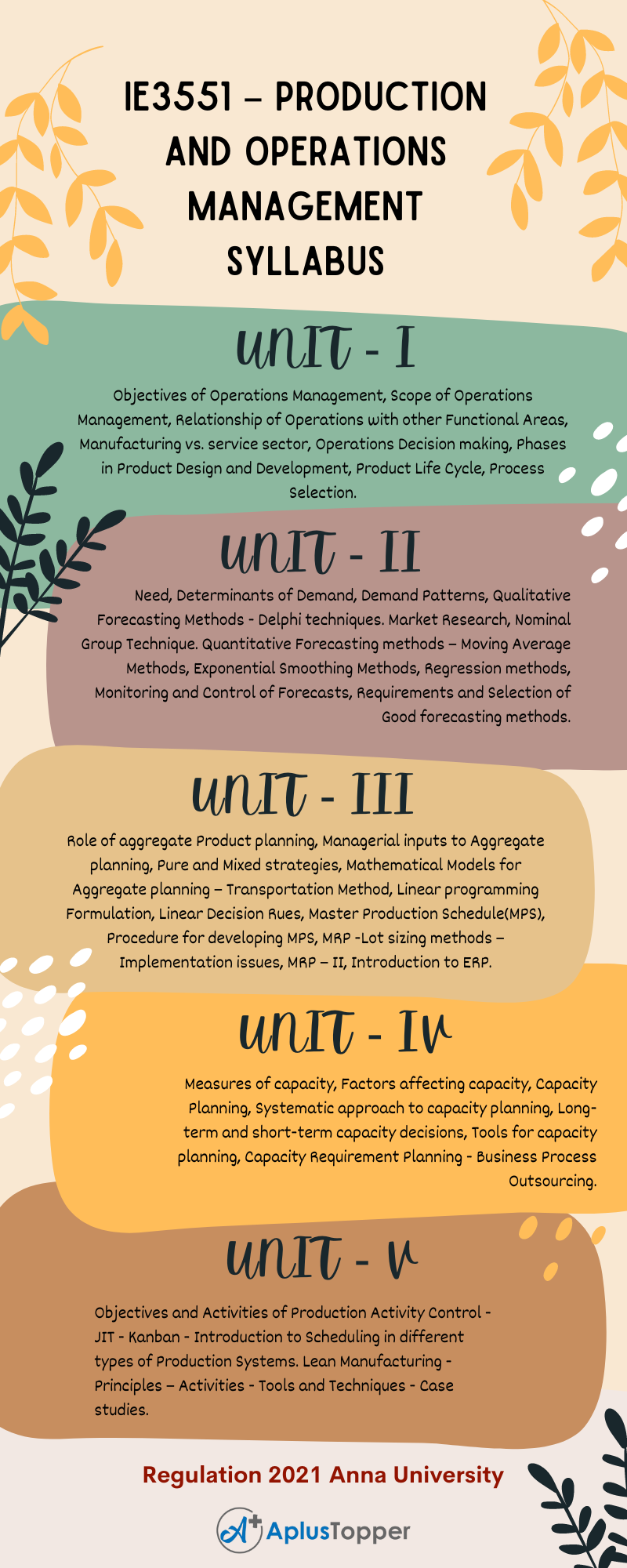Subject code IE3551 deals with semester V of the Production and Operations Management Syllabus of Anna University based on regulation 2021. In this article, we would like to discuss the syllabus of Production and Operations Management. Let’s see.
We aim to provide the unit-wise IE3551 – Production and Operations Management syllabus. It will avoid confusion for students during the examination period. We added the required textbooks and references to the syllabus. I hope this information is useful. You better be quick to read the syllabus prior than the others and prepare well for examinations. Kindly read this article thoroughly and then share it with your classmates. A decent qualified certificate from the university will help you to reach heights The following syllabus will assist you.
If you want to know more about the syllabus of B.E. Industrial Engineering and Management connected to an affiliated institution’s four-year undergraduate degree program. We provide you with a detailed Year-wise, semester-wise, and Subject-wise syllabus in the following link B.E. Industrial Engineering and Management Syllabus Regulation 2021 Anna University.
Aim Of Objectives:
- Recognize and appreciate the concept of Production and Operations
- Management in creating and enhancing a firm’s competitive advantages.
- Describe the concept and contribution of various constituents of Production and Operations Management (both manufacturing and service).
- Relate the interdependence of the operations function with the other key functional areas of a firm.
- Teach analytical skills and problem-solving tools to the analysis of the operations problems.
- Apply scheduling and Lean Concepts for improving System Performance.
IE3551 – Production and Operations Management Syllabus
Unit – I: Introduction
Objectives of Operations Management, Scope of Operations Management, Relationship of Operations with other Functional areas, Manufacturing Vs Service sector, Operations Decision making, Phases in Product Design and Development, Product Life Cycle, Process Selection.
Unit – II: Forecasting
Need, Determinants of Demand, Demand Patterns, Qualitative Forecasting Methods – Delphi techniques. Market Research, Nominal Group Technique. Quantitative Forecasting methods – Moving Average Methods, Exponential Smoothing Methods, Regression methods, Monitoring and Control of Forecasts, Requirements and Selection of Good Forecasting Methods.

Unit – III: Aggregate Planning And Material Requirement Planning
Role of aggregate Product planning, Managerial inputs to Aggregate planning, Pure and Mixed strategies, Mathematical Models for Aggregate planning – Transportation Method, Linear programming Formulation, Linear Decision Rues, Master Production Schedule(MPS), Procedure for developing MPS, MRP -Lot sizing methods – Implementation issues, MRP – II, Introduction to ERP.
Unit – IV: Capacity Management
Measures of capacity, Factors affecting capacity, Capacity Planning, Systematic approach to capacity planning, Long-term and short-term capacity decisions, Tools for capacity planning, Capacity Requirement Planning – Business Process Outsourcing.
Unit – V: Production Activity Control And Lean Manufacturing
Objectives and Activities of Production Activity Control – JIT – Kanban – Introduction to Scheduling in different types of Production Systems. Lean Manufacturing – Principles – Activities – Tools and techniques – Case studies.
Text Books:
- Panneerselvam. R, Production and operations Management, PHI, 3rd Edition, 2012.
References:
- Lee J. Krajewski, Manoj K. Malhotra, Larry P. Ritzman, Operations Management: Processes and Supply Chains Pearson Education, 11th Edition, 2015.
- Norman Gaither, Greg Frazier, Operations Management, Thomson Learning, 9th Edition, 2002.
- William J Stevenson, Operations Management, McGraw Hill, 13th Edition, 2018.
Related Posts On Semester – V:
Must Read:
